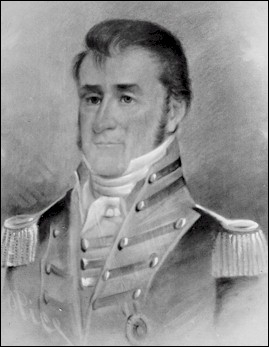1754-1844
Associate Justice of the New York Supreme Court of Judicature, 1792-1800
Chief Justice, 1801-1804
Morgan Lewis was the son of Francis Lewis, one of the signers of the Declaration of Independence. He was born on October 16, 1754 in New York City and received his early education at the Academy in Elizabethtown. He then attended the College of New Jersey (now Princeton ) from which he graduated in 1773 and immediately began his legal studies in the law office of John Jay.
In 1774, he joined a company of volunteers and went on to have an illustrious military career as chief of staff to General Horatio Gates and as Quartermaster General in the Revolutionary War and in the War of 1812.
Following the Revolution, he was admitted to the bar and began a law practice in New York City. With Alexander Hamilton and Brockholst Livingston, he represented Joshua Waddington in the landmark 1784 case of Rutgers v. Waddington.
Lewis was a member of the Assembly during the years 1789 and 1790 and had the honor of escorting George Washington at the nation’s first presidential inauguration in April 1791.
Morgan Lewis was appointed Attorney General of the State of New York on November 8, 1791 and just a year later, on December 24, 1792, he was appointed an Associate Justice of the New York Supreme Court of Judicature. He became the fifth Chief Justice of New York on October 28, 1801. Justice Lewis presided over the famous criminal libel trial of People v. Croswell in Court of Sessions in Columbia County, and at the appeal to the New York Supreme Court of Judicature.
Defeating Aaron Burr, he was elected the 4th Governor of New York, and took office in 1804. That year, the Legislature adopted his proposal to appropriate the proceeds of the sale of public lands exclusively for education, and these monies became the foundation of the public school fund. During his governorship, the U.S. Military Academy at West Point was established and the State Militia was restructured.
During the 1807 gubernatorial campaign, Lewis instigated two prosecutions for criminal libel — People ex rel Lewis v Farmer (1807) where Farmer was charged with criminal libel for promulgating anti-Lewis resolutions, and People ex rel Lewis v Few where Few, the chair of a political meeting that passed a resolution condemning the Farmer prosecution, was similarly charged. In the 1807 election, Lewis lost the governorship to Daniel Tompkins, a Justice of the New York Supreme Court of Judicature and later Vice President of the United States. Lewis returned to public office in 1811-1814, when he was elected as a member of the New York State Senate.
Morgan Lewis died in New York City on April 7, 1844. Lewis County, the Town and Village of Lewiston, and the Town of Lewis in Essex County, New York were all named in his honor.
Sources
“The Supreme Court of New York under the Constitution of 1777. ” 23 Medico-Legal Journal 102 (1905-1906).
Hall of Governors: http://www.hallofgovernors.ny.gov/MorganLewis

